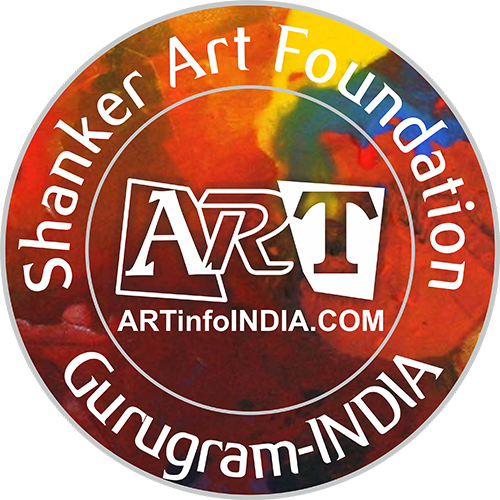
- This event has passed.
Codes of a Future, Traces of the Ancient
April 22, 2022 @ 11:00 am - May 20, 2022 @ 7:00 pm IST

A Solo Show by Anni Kumari
We all carry with us imprints of the past, guiding our every sense and pre-empting our future pathways. The very basis of nature, everything around us and within us, is made up of these imprints presenting themselves as shapes, spaces, structures and fundamentally – patterns. Recognition and repetition is essential to the human way of making sense of the world and expressing it in our unique interpretation. In order to survive, functionality has always been deeply ingrained in all aspects of life, especially aesthetics. Anni Kumari embodies this unique balance by being both a native of methodological scientific temperament and a practitioner of fluid creativity to express her inner self and thoughts.
On the surface her works seem simple, minimal, almost decorative. Today we take that to usually mean non-complex and hence by default non-intellectual or lacking in depth. However, one of the most ancient and primal tendencies in humans is to seek basic order, rhythm and beauty. It is seen in all the areas of the arts, like dance, music, poetry, design and architecture, thereby proving that searching for simplicity in visual pleasure is our evolutionary heritage. Anni de-clutters these over-intellectualized ideas and goes back to that original minimalism that is coded within us. Ironically, despite this relatable exterior, the works are built on nuanced modules and grids from Mathematics using concepts like the Fibonacci Series, Fractal Geometry and prime number sequencing. Mathematics is a universal theme applicable to all fields of life from Geography to Biology and Cosmology. Hence this multi-layered alignment of form and intention presents Anni’s works in an awe-inspiringly synchronized manner. When asked about this mastery she humbly pays homage to one of her major sources of inspiration: Indian traditional art and temple architecture. Alignment was ingrained in every area of ancient Indian culture with our temples emulating the primordial shapes of the circle and square and calculated precision being used in even the simplest of things like the Rangoli design pattern of Kolam in Tamil Nadu or the monochrome geometry in the Khovar folk art of Jharkhand. These cultural synergies were rooted in ideas of growth and consciousness, with these spaces and practices being energy centers for people. Interestingly, this basic mathematical foundation is still incredibly relevant even today in our modern lives with prime numbers and such being used actively in computing and creating unique codes for digital algorithms.
It is therefore an interconnectedness that brings together past and future, real and metaphysical, material and spiritual, and most importantly, experiential. The works are dynamic in motion and continually evolving under the gaze of the viewer. The pattern is reminiscent of something that we have seen before in many forms, from the imprint of our thumbs to the shapes of river deltas, the points on spatial maps to the constellation of the stars. This allows for a multi-reading of it that Anni wants her audience to instinctively and intuitively engage in.
Much like life, the dualities, the subtleties and the synchronicities in her art are easily connected with but also deeply aspirational.
Anni Kumari has received her degree in B.A political science from Miranda College, Delhi University, and then went on to study BFA (paintings) and MFA (paintings) at the College of Art Delhi.
The artist is credited with several group and solo shows. Her work has also been shown in India Art Fair (2017).
She had a solo show titled ‘Algorhythms,’ co-organized by Anant Art and Apparao Galleries, and a two-person show titled ‘Blurring Boundaries,’ held at 079 Stories in Ahmedabad.
Anni Kumari has received numerous National and International Awards like ‘United Nations Exhibitions Programme, Atlanta, USA’ and grants from Sahapedia-UNESCO, Artreach India, the Ministry of Culture, the Government of India, and the University Grants Commission (2015).
